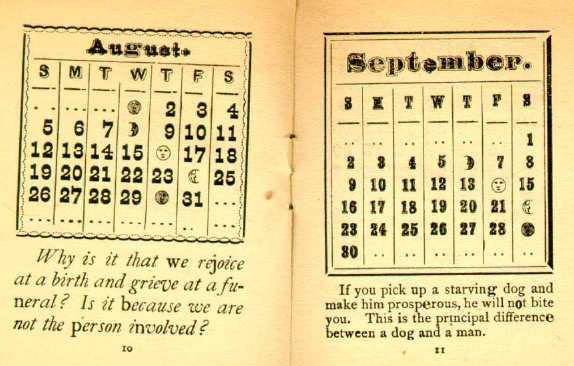Decoding The Delphic Pronouncements Of Pudd’nhead Wilson’s Calendar: Satire, Social Commentary, And The Absurdity Of Time
Decoding the Delphic pronouncements of Pudd’nhead Wilson’s Calendar: Satire, Social Commentary, and the Absurdity of Time
Associated Articles: Decoding the Delphic pronouncements of Pudd’nhead Wilson’s Calendar: Satire, Social Commentary, and the Absurdity of Time
Introduction
With nice pleasure, we are going to discover the intriguing subject associated to Decoding the Delphic pronouncements of Pudd’nhead Wilson’s Calendar: Satire, Social Commentary, and the Absurdity of Time. Let’s weave attention-grabbing data and provide contemporary views to the readers.
Desk of Content material
Decoding the Delphic pronouncements of Pudd’nhead Wilson’s Calendar: Satire, Social Commentary, and the Absurdity of Time

Mark Twain’s Pudd’nhead Wilson’s Calendar shouldn’t be merely a set of quirky aphorisms; it is a microcosm of the novel itself, a satirical reflection on human nature, societal hypocrisy, and the fluid, typically arbitrary, nature of time. Whereas ostensibly a calendar providing day by day pronouncements, the "knowledge" contained inside is intentionally paradoxical, ironic, and sometimes nonsensical, mirroring the chaotic and unpredictable occasions unfolding within the novel’s narrative. Understanding these quotes requires acknowledging Twain’s masterful use of humor and his sharp critique of the prevailing social and political local weather of his time.
The calendar’s pronouncements aren’t meant to be taken actually. They operate as miniature parables, every encapsulating a bigger reality, typically obscured by the seemingly contradictory or absurd phrasing. This deliberate ambiguity forces the reader to have interaction actively with the textual content, prompting introspection and difficult pre-conceived notions. The seemingly random nature of the entries additional underscores the unpredictable and sometimes illogical facets of human expertise.
Let’s study a number of examples, analyzing their context throughout the novel and their broader satirical implications:
"October 27. It’s higher to be born fortunate than wealthy." This seemingly simple assertion subtly critiques the societal obsession with wealth. Whereas riches might provide materials consolation, true success, in keeping with Twain, is usually depending on probability, luck, or lucky circumstances. Within the novel, the unintended change of Roxy’s kids, Tom and Chambers, exemplifies this completely. Tom, born into privilege, enjoys a lifetime of ease regardless of his inherent lack of character, whereas Chambers, regardless of his noble birthright, suffers hardship and injustice. This assertion subtly highlights the arbitrary nature of social standing and the restrictions of fabric wealth in figuring out true happiness or success.
"November 14. The easiest way to maintain your well being is to eat what you do not need, drink what you do not like, and do what you’d somewhat not." This quote is a transparent instance of Twain’s ironic wit. It satirizes the often-absurd well being recommendation prevalent in his time, suggesting a sort of masochistic self-denial as the trail to well-being. The assertion’s inherent contradiction – doing issues you do not need to do – highlights the hypocrisy typically surrounding self-improvement and the unrealistic expectations positioned upon people. It is a humorous jab on the often-purposeless pursuit of well being and wellness.
"December 2. It’s higher to know nothing than to know what ain’t so." This seemingly easy maxim carries profound implications. It underscores the hazard of misinformation and the significance of vital pondering. Within the context of the novel, this quote speaks to the pervasive ignorance and prejudice surrounding race and social class in antebellum Missouri. The ingrained biases of the group blind them to the reality about Tom and Chambers’ identities, resulting in a collection of tragic penalties. The "what ain’t so" represents the false narratives and societal myths that perpetuate injustice and hinder progress.
"January 17. In the event you decide up a ravenous canine and make him affluent, he is not going to chew you. That is the principal distinction between a canine and a person." This quote is without doubt one of the most biting and memorable from the calendar. It is a stark commentary on human ingratitude and the often-unjust therapy of these much less lucky. Twain makes use of the stark distinction between canine loyalty and human selfishness to spotlight the hypocrisy and ethical failings of humanity. Within the novel, Tom’s conduct embodies this cynical statement, as he abuses his privileged place and exhibits no gratitude for the alternatives afforded to him.
"February 19. Go to Heaven for the local weather, Hell for the corporate." This seemingly flippant comment subtly critiques the hypocrisy of non secular dogma. The main target shifts from the ethical implications of heaven and hell to a extra materialistic evaluation of their respective attributes. The humorous juxtaposition of nice climate with attention-grabbing firm means that Twain prioritizes human connection and expertise over strict adherence to non secular doctrines. This irreverent strategy is attribute of Twain’s satirical model, difficult standard non secular beliefs.
"March 10. At all times do proper. It will gratify some individuals, and astonish the remainder." This quote encapsulates the core of Twain’s ethical philosophy. It means that doing what is correct must be an intrinsic motivation, no matter exterior validation. The astonishment of others highlights the pervasive hypocrisy and ethical ambiguity inside society. Within the novel, Pudd’nhead Wilson’s unwavering dedication to justice, even within the face of adversity, exemplifies this precept. His use of fingerprinting, a revolutionary method on the time, demonstrates his dedication to reality and justice, even when it means difficult the established order.
The calendar’s entries, taken as an entire, symbolize a satirical tapestry woven with threads of irony, paradox, and absurdity. They replicate the chaotic and unpredictable nature of life, the pervasive hypocrisy of human conduct, and the significance of vital pondering and impartial judgment. The seemingly random nature of the entries additional underscores the unpredictable and sometimes illogical facets of human expertise. By presenting these seemingly easy pronouncements, Twain compels the reader to actively interact with the textual content, difficult pre-conceived notions and prompting introspection on the complexities of human nature and the ever-elusive pursuit of reality and justice. The calendar’s pronouncements aren’t merely witty observations; they’re a robust software used to amplify the central themes and satirical critiques that permeate the whole narrative of Pudd’nhead Wilson. They function a continuing reminder of the complexities and contradictions inherent in human existence, a reminder that’s as related immediately because it was in Twain’s time. The calendar, due to this fact, shouldn’t be merely a whimsical addition to the novel; it’s an integral a part of its satirical energy and enduring relevance.








Closure
Thus, we hope this text has supplied helpful insights into Decoding the Delphic pronouncements of Pudd’nhead Wilson’s Calendar: Satire, Social Commentary, and the Absurdity of Time. We thanks for taking the time to learn this text. See you in our subsequent article!
Leave a Reply